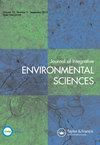Peri-urban territories and WEF nexus: the challenges of Brazilian agrarian reform areas for social justice
IF 3.5
4区 环境科学与生态学
Q3 ENVIRONMENTAL SCIENCES
Journal of Integrative Environmental Sciences
Pub Date : 2020-12-15
DOI:10.1080/1943815x.2020.1844757
引用次数: 0
Abstract
ABSTRACT Over the past three decades, agrarian reform areas have transformed urban and rural spaces across Brazil. Although these areas’ creation reduced inequalities and environmental problems, their residents still experience several constraints and vulnerabilities associated with water, energy, and food provision. Drawing on the water-energy-food (WEF) nexus’ critical and territorial perspectives, this paper aims to better understand the agrarian reform areas’ challenges in peri-urban interfaces towards social justice. We analyse a territory in the Northeast portion of the São Paulo State, where it is located the Sepé Tiaraju agrarian reform settlement in interface with two municipalities. We suggest that agrarian reform areas can activate a progressive and concrete environmental change at the local level where food is the key element to redefining the area’s nexus. However, socio-political and spatial dynamics involving water and energy for the sugarcane sector, the municipal government, and tense relationships among residents around food also reproduce unequal access to resources. This paper contributes to the emerging critical literature and its efforts to politicize the nexus debate, giving more nuanced views to the complex and contradictory dynamics involving environmental problems and social justice struggles.城市周边地区与世界经济论坛的联系:巴西土地改革领域对社会正义的挑战
在过去的三十年里,土地改革地区改变了巴西的城市和农村空间。虽然这些地区的建立减少了不平等和环境问题,但其居民仍然面临着与水、能源和粮食供应有关的一些限制和脆弱性。利用水-能源-粮食(WEF)关系的批判性和地域视角,本文旨在更好地理解土地改革地区在城郊社会正义方面面临的挑战。我们分析了圣保罗州东北部的一块领土,该领土位于sepeetiaraju土地改革解决方案与两个城市的交界处。我们建议,土地改革地区可以在地方层面上激活渐进和具体的环境变化,其中粮食是重新定义该地区关系的关键因素。然而,社会政治和空间动态涉及甘蔗部门的水和能源,市政府,以及居民之间围绕粮食的紧张关系,也导致了资源获取的不平等。本文对新兴的批评文献及其将关系辩论政治化的努力做出了贡献,对涉及环境问题和社会正义斗争的复杂和矛盾的动态提供了更细致入微的观点。
本文章由计算机程序翻译,如有差异,请以英文原文为准。
求助全文
约1分钟内获得全文
求助全文
来源期刊

Journal of Integrative Environmental Sciences
ENVIRONMENTAL SCIENCES-
CiteScore
3.90
自引率
0.00%
发文量
13
审稿时长
>12 weeks
期刊介绍:
Journal of Integrative Environmental Sciences (JIES) provides a stimulating, informative and critical forum for intellectual debate on significant environmental issues. It brings together perspectives from a wide range of disciplines and methodologies in both the social and natural sciences in an effort to develop integrative knowledge about the processes responsible for environmental change. The Journal is especially concerned with the relationships between science, society and policy and one of its key aims is to advance understanding of the theory and practice of sustainable development.
 求助内容:
求助内容: 应助结果提醒方式:
应助结果提醒方式:


